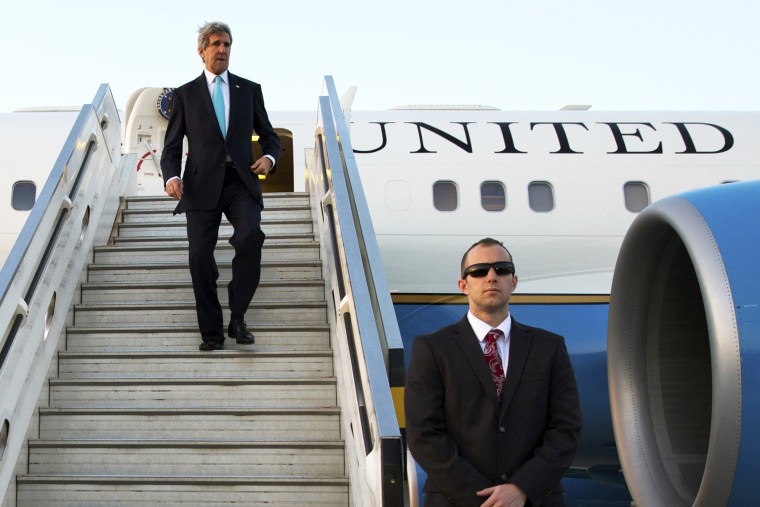The last time two Americans of this prominence traveled to Congo (then Zaire), it was for the boxing match of the century: the Rumble in the Jungle between George Foreman and Muhammad Ali. Forty years later, Secretary of State John Kerry and U.S. Special Envoy Russ Feingold are going to Kinshasa with a more peaceful agenda than their pugilistic predecessors: to help end what has become the deadliest conflict globally since World War II.
Over the past 20 years, the war in Congo has claimed nearly 6 million lives. Over 50 armed groups and multiple foreign armies have destabilized Congo, using tens of thousands of child soldiers and raping hundreds of thousands of women. Because of the violence, nearly three million Congolese people today have been displaced from their homes.
Yet things are beginning to look up for Congo. A revitalized United Nations peacekeeping force led by African nations is helping dislodge armed groups from their hideouts. The most powerful of these, the M23 militia, was militarily defeated in late 2013, following military pressure from Congo and the peacekeepers as well as international pressure on the rebels’ backers in the Rwandan government. The U.S. Congress contributed by passing legislation which has reduced armed groups’ profits from minerals and has helped make over two-thirds of tin, tantalum, and tungsten mines conflict-free. Those combined efforts have led over 8,000 combatants to disarm since M23’s defeat. Another warlord was filmed earlier this week pleading on his knees to accept his disarmament. A peace process for Congo is now beginning, led by sub-regional power Angola and supported by Feingold and U.N. Special Envoy Mary Robinson.
However, there are still major challenges to peace, which is where Kerry and Feingold can have an impact. In their trip to Congo and neighboring Angola, a focus on three issues could pay significant peace dividends.
First, Kerry and Feingold should urge Congolese President Joseph Kabila and Angolan President Jose Eduardo dos Santos to make the peace process more inclusive and to widen its agenda. A peace agreement reached by the governments will only be sustainable if Congolese people’s input is meaningfully included. Kerry and Feingold should work with the presidents to establish a feedback loop to link civil society, including women, to the high-level discussions.
The talks must also help boost conflict-free regional economic cooperation, a key to regional peace. If Congo and its neighbors can reform and integrate their economies in a more transparent manner and increase investment in the region, they will be less likely to support cross-border rebellions because they will be profiting more from legitimate business than from a war economy.
The potential profits from peace are enormous. For example, one industrial conflict-free gold mine in eastern Congo generated $115 million last year in an area that used to be rife with armed groups and illegally smuggled gold. Local communities benefited, too, as 200 miles of roads were built in the area, decreasing food prices by 30 to 50%. The possibilities are numerous: Private Congolese and regional companies could invest in infrastructure and mines, the region could develop processing plants, multinationals could bring in capital, and the regional services industry would benefit.
Second, the two statesmen must urge President Kabila to make progress on critical security issues and should not shy away from strong measures to back up their discussions. Kabila must break fully with the FDLR rebellion, a militia on the U.S. terrorist list. Tackling the FDLR is critical to addressing regional security, preventing a future M23, and protecting civilians. Kabila should partner with the UN peacekeepers to combat the rebellion and prosecute Congolese army officers who collaborate with it. Relatedly, Kabila must finalize agreement with donors on programs for ex-combatants, which would incentivize many more armed group fighters to defect. If concrete progress is not made, the U.S. should urge the World Bank to delay votes on the major hydroelectric Inga III dam project in Congo.
Finally, Kerry and Feingold should work to convince President Kabila to not alter the constitution to run for a third term. They should build multilateral pressure along these lines, including possible targeted sanctions. They should also urge Congo to hold local, provincial, and presidential elections and work with donors to robustly support them.
Forty years after the Rumble in the Jungle, the U.S. has a chance to advance the goals of peace, justice and democracy in Congo. Kerry and Feingold have an opportunity to make a far more lasting impact on Congo even than Ali and Foreman.
